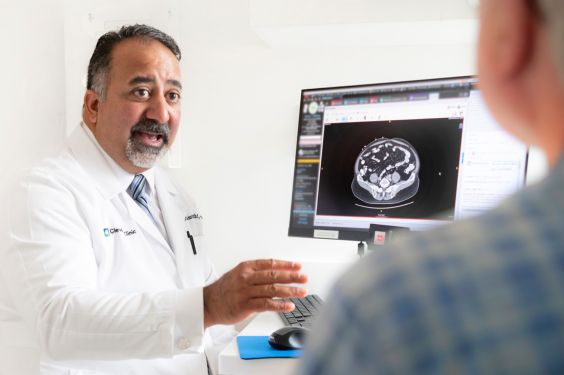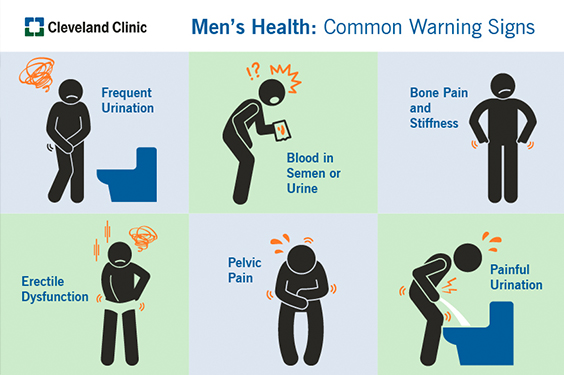Time for a checkup? Cleveland Clinic provides the routine care men need.
It’s no secret: Statistically, men are much less likely than women to seek medical care. However, health issues can develop and it’s important for men to consult with their physician if they suspect something is not quite right.
Dr. Krishnamurthi says some of the most common health problems men face relate to sexual function and urination. These issues may be early warning signs of something more serious — trouble getting or keeping an erection can be a sign of heart disease and waking up at night to urinate can be a sign of obstructive sleep apnea.
When to see a doctor
Men’s health conditions often share the same signs and symptoms. Although there may be a simple explanation and an easy fix, there’s a chance that you could need treatment before something gets worse.
- Blood in your urine or semen.
- Urination problems, including pain or burning, a need to go all the time, difficulty getting started, or a weak flow.
- New or worsening erectile dysfunction.
- Painful ejaculation.
- Changes or pain in your testicles or penis, including swelling, hardness, a lump or a feeling of heaviness.
- Ongoing pain or stiffness in your lower back, hips or legs.
- Low energy or sex drive (libido).
- Penile curvature.
Listen to your body. It may be giving you advance warning of something more serious.
Who can benefit from Integrative and Lifestyle Medicine?

Your body’s maintenance schedule
“Your body is just like a car or home heating system — it needs routine maintenance. Routine checkups are necessary to ensure that your body is working as it should be,” says Brandon Mooney, PA-C, a urology and men’s health provider at Wooster Milltown Specialty & Surgery Center and Strongsville Family Health & Surgery Center.
If you’re a man 40 or older, seeing a urologist regularly is most likely the last thing on your mind when you have a million other things to take care of. But as you go through your 40s, quality-of-life issues become more important. A men’s health expert can help guide you on what to expect, useful lifestyle changes, when to simply observe and when to treat a problem.
For men, routine health maintenance includes:
- Prostate-specific antigen (PSA) testing. A PSA (prostate-specific antigen) test is a blood test that helps healthcare providers diagnose and manage prostate cancer. If you have elevated PSA levels, you may need additional testing.
- Self-exam of testicles. Men ages 15-35 should do self-exams once a month. Do it in the shower or in bed when your scrotum skin is warm and relaxed. Roll each testicle between your thumb and fingers, feeling for any hard lumps that feel like rocks.
- Vaccinations. Protect yourself from the flu, meningitis, pneumonia, shingles, sexually transmitted diseases and more. Your doctor can advise you on the vaccinations you need.
- Annual physical exam. Make sure to tell your doctor how you are feeling, what is bothering you and what symptoms you are having.
Don’t ignore the symptoms
Your men’s urological cancer team
A team-based approach to addressing men’s urological cancer concerns in Medina and the surrounding communities is provided by Dr. Krishnan, along with Michael Gangel, Jr., MD, and John Wegryn, MD.
Roy Miler, MD
Lorem ipsum dolor sit amet, consectetur adipiscing elit, sed do eiusmod tempor incididunt ut labore e.
Lorem ipsum dolor sit amet, consectetur adipiscing elit, sed do eiusmod tempor incididunt ut labore et
Dolore magna aliqua. Quis ipsum suspendisse ultrices gravida. Risus commodo viverra maecenas accumsan lacus vel facilisis. Lorem ipsum dolor sit amet, consectetur adipiscing elit.
Roy Miler, MD
Lorem ipsum dolor sit amet, consectetur adipiscing elit, sed do eiusmod tempor incididunt ut labore e.
Lorem ipsum dolor sit amet, consectetur adipiscing elit, sed do eiusmod tempor incididunt ut labore et
Dolore magna aliqua. Quis ipsum suspendisse ultrices gravida. Risus commodo viverra maecenas accumsan lacus vel facilisis. Lorem ipsum dolor sit amet, consectetur adipiscing elit.
Interested in learning more about Integrative and Lifestyle Medicine?
Medical referrals aren’t necessary and virtual appointments are available for many services offered through Integrative and Lifestyle Medicine. Most insurance companies cover Integrative and Lifestyle Medicine care, but check with your provider about your coverage.
Ohio’s top urology experts care for you, so you can care for it all.
To schedule an appointment, call 216.444.5600
You're Invited!
Sign up to receive invitations to upcoming online health talks!
SIGN UP







